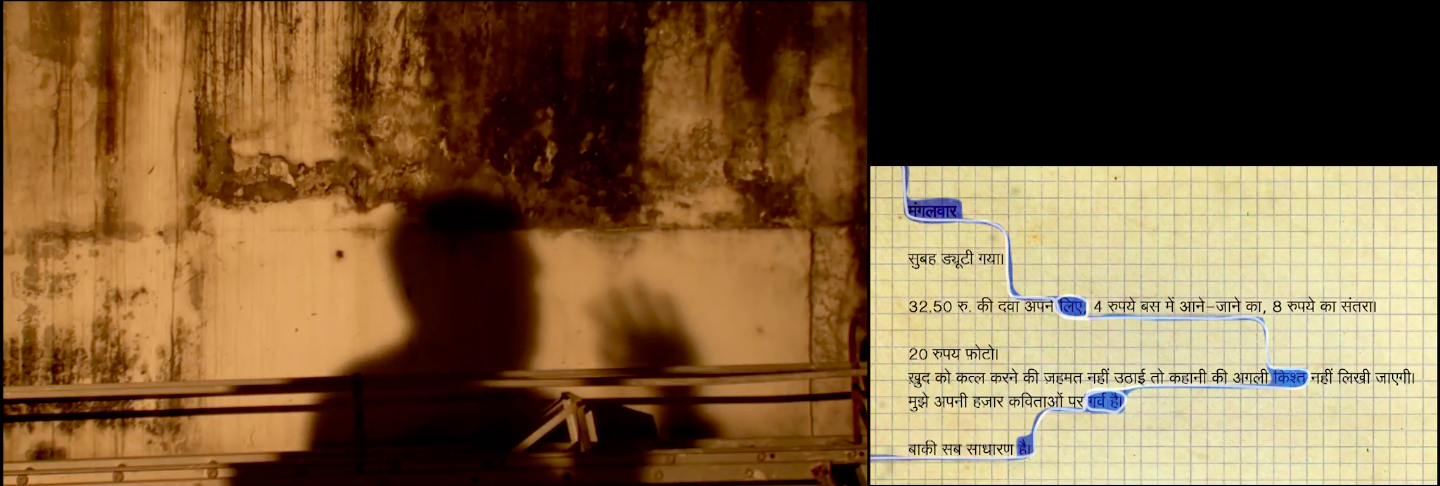Staff picks
Strikes at Time
Raqs Media Collective
2011
18 Minutes
Staff Picks
Date
January 6–February 2, 2021
Join us on e-flux Video & Film for a screening of Raqs Media Collective’s Strikes at Time (2011), on view from Wednesday, January 6 through Tuesday, February 2, 2021. The film is presented together with Raqs Media Collective’s The Blood of Stars (2017) as part of the monthly series Staff picks.
Strikes at Time is a lucid dream, readings from an occasional anonymous journal, and a long walk at the edge of the city of the night. In that no man’s land annexed by the awakening mind from the fatigue of the laboring day, the work weaves together a disquisition on time in the form of a discreet annotation on the philosopher Jacques Rancière’s Nights of Labor, together with renditions of the found text of a worker’s diary by the CyberMohalla Ensemble, a group of unorthodox proletarian urbanists that Raqs has been in dialogue with over a decade.
The shadowy presence of a Yaksha and Yakshi—guardians of wealth in Indic mythologies—stands watching over the work, marking time with questions.
Some questions, with some answers:
Why are we making this work?
Because we are still thinking about the silence that followed what a friend who worked in a machine tool factory said on a summer night in Faridabad early in the last decade of the twentieth century.
What did he say?
We slept a lot on string cots on his terrace that summer. Days and nights were welded together in heat. Each night raised hopes of a breeze, and brought stillness into the conversation. He had just been suspended from the machine tool factory. He would go to the factory gate every morning to see if they had rescinded his suspension order and then make his way to a workers’ library.
We would meet there, with books and newspapers and notebooks and parcels from elsewhere. There were strikes in Pittsburgh, a lockout in Bombay, and a thousand daily insubordinations everywhere, especially next door in his factory. We thought we had to think of everything. There would be arguments, agreements, disagreements, and more talking. Someone asked about making a calculation that factored in a relationship between the repeated admissions of defeat by intellectuals and the continued demands of sacrifice from workers. There would be glasses of lemon tea till sundown. And then we would go up to his terrace and talk some more. The night made us all speak differently. We spoke less of sacrifice and surplus value and more of other things.
What other things?
Just things. Like the thing he said that night.
What did he say?
He said, looking up at the night sky, “The clamour of metal does not crowd your head when you count the stars. What a relief it is to not to have to enter the factory.”
What does that mean?
We are making Strikes at Time to figure out what that means. Where does the longing for the horizon take us? The night’s indigo face scans the stars, the city’s bleak frontier for signs of life. Can there be another life?
Can there be another life?
A young woman found her uncle’s amazing diary. Every day had its entry, listing expenditures, purchases, loans, debts, and at the end of each page, the phrase “all else is ordinary.”
What’s so special about that?
Nothing much. Just the extraordinary diligence of the diarist who so duly noted the ordinary in every page. Can I even know whether or not I can have another life, if I don’t exhaust the limits of this one?
If you do it everyday, how can you even know that you are standing at that limit?
What can we say? We could say it strikes us whenever we look for the horizon. Whenever we let the night take hold of the burdens of the day, and loosen its tight bundle, scattering fragments of exhaustion through the hours that remain till dawn. Each twilight sees the day carry its own exit sign. We all walk out of the working day into the waiting darkness. And then, darkness strikes at time like the phosphorous head of a matchstick striking the serrated edge of a book of matches.
When we read that incendiary book, Nights of Labor by Jacques Rancière, what else did we read, across the translations, between the words, beyond this world, in that flash of recognition of the limits of every day ?
We thought we should try and find out. That is why we are making this work.
For more information, contact program@e-flux.com.
